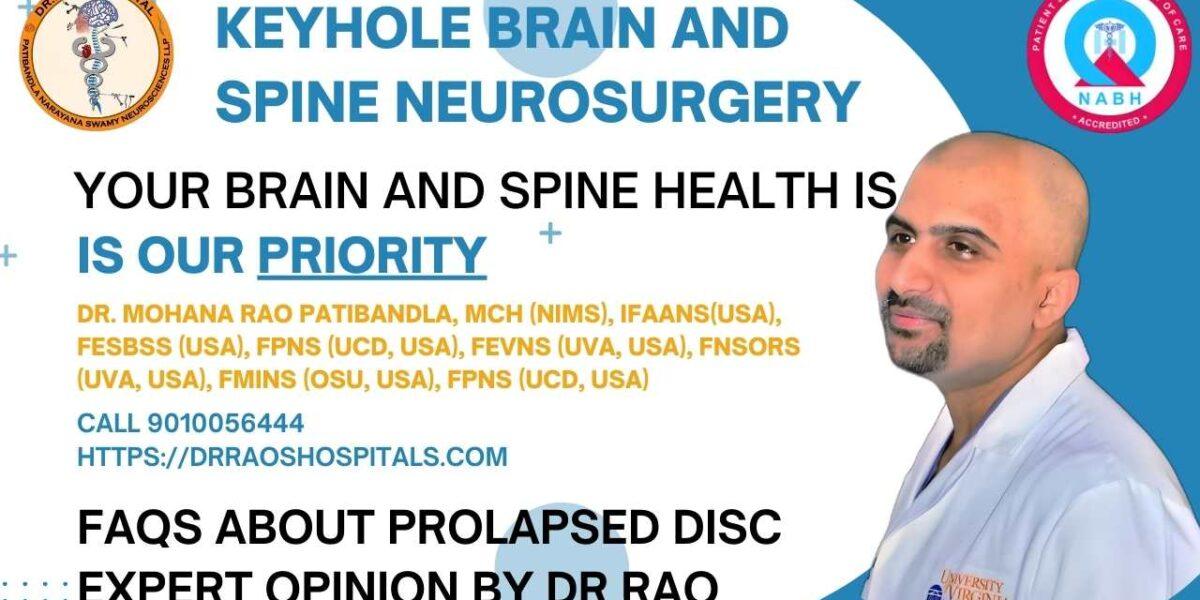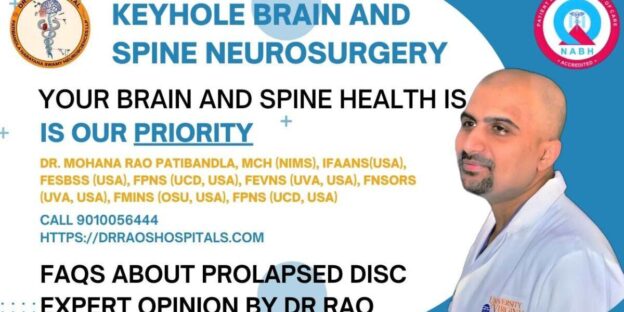FAQs about Prolapsed Disc expert opinion by Dr Rao
- What is a prolapsed disc?
- A prolapsed disc, also known as a herniated or slipped disc, occurs when the soft inner core of a spinal disc pushes through its outer shell, causing pain and discomfort.
- What causes a prolapsed disc?
- Common causes include aging, improper lifting techniques, repetitive movements, and factors that increase pressure on the spine.
- What are the symptoms of a prolapsed disc?
- Symptoms may include back pain, radiating pain down the legs, numbness, tingling, and muscle weakness.
- How is a prolapsed disc diagnosed?
- Diagnosis involves a combination of medical history, physical examination, and imaging tests like an MRI or CT scan.
- Can a prolapsed disc heal on its own?
- Mild disc herniations can often improve with rest, physical therapy, and medications. Severe cases might require surgical intervention.
- What nonsurgical treatments are available?
- Nonsurgical treatments include rest, physical therapy, pain medications, and epidural injections to manage pain and inflammation.
- When is surgery recommended for a prolapsed disc?
- Surgery is considered when conservative treatments don’t alleviate symptoms or if there’s significant nerve compression causing weakness or loss of bowel/bladder control.
- What are the surgical options for a prolapsed disc?
- Surgical options include microdiscectomy, laminectomy, and minimally invasive techniques. Dr. Rao specializes in these advanced surgical approaches.
- Is minimally invasive surgery suitable for everyone?
- Minimally invasive surgery benefits many patients, but eligibility depends on factors such as the severity of the condition, medical history, and overall health.
- What are the advantages of minimally invasive spine surgery?
- Minimally invasive surgery offers smaller incisions, reduced blood loss, faster recovery, and less post-operative pain than traditional open surgery.
- Why choose Dr. Rao for prolapsed disc surgery?
- Dr. Rao is a renowned spine surgeon known for his expertise in minimally invasive techniques, ensuring precision and better patient outcomes.
- Tell me more about Dr. Rao’s hospital.
- Dr. Rao’s hospital is a leading spine surgery center in India, equipped with state-of-the-art facilities and a team of skilled professionals.
- What’s the recovery time after surgery?
- Recovery time varies, but with minimally invasive techniques, patients often experience a quicker recovery and return to their daily activities sooner.
- Are there any risks associated with prolapsed disc surgery?
- As with any surgery, there are risks involved. However, Dr. Rao’s experience and advanced techniques minimize these risks.
- How can I schedule a consultation with Dr. Rao?
- You can call 9010056444 or visit the hospital’s website at drraoshospitals to book a consultation.
- Will I need to stay in the hospital after surgery?
- The duration of the hospital stay varies based on the surgery and individual patient needs.
- What’s the success rate of prolapsed disc surgery at Dr. Rao’s hospital?
- Dr. Rao’s hospital has an excellent track record of successful spine surgeries with favorable patient outcomes.
- Is physical therapy necessary after surgery?
- Physical therapy is often recommended post-surgery to aid in recovery and strengthen the back muscles.
- How long before I can resume normal activities?
- Patients typically resume normal activities sooner with minimally invasive techniques, but the exact timeline depends on the individual case.
- What aftercare should I follow at home?
- After spine surgery, proper postoperative care is crucial for a successful recovery. Here are some specific instructions to follow:
- Immediate Post-Surgery Care:
- Hospital Stay: Your stay in the hospital will depend on the type of surgery performed. Your medical team will monitor your condition and provide the necessary care.
- Pain Management: Pain and discomfort are expected after surgery. Your healthcare team will provide pain medications as needed.
- Incision Care: Keep the surgical incision clean and dry. Follow the dressing change instructions provided by the hospital staff.
- Mobility: Gradually start moving around with assistance from medical staff. Follow their guidance to avoid strain on your incision site.
- Discharge Instructions:
- Home Transportation: Arrange for a family member or friend to drive you home. Avoid driving until your surgeon clears you.
- Incision Care: Continue to keep the incision clean and dry. Monitor for signs of infection, such as redness, swelling, or discharge. Contact your surgeon if you notice any concerning changes.
- Pain Management: Take pain medications as prescribed. If your pain is well-controlled, you may transition to over-the-counter pain relievers with your doctor’s approval.
- Activity Restrictions: Avoid bending, lifting heavy objects, and strenuous activities for the first few weeks. Follow your surgeon’s recommendations for the gradual resumption of everyday activities.
- Hygiene: Shower as directed by your surgeon. Avoid soaking in a tub, hot tub, or swimming pool until cleared by your doctor.
- Diet and Nutrition: Eat a balanced diet of protein, vitamins, and minerals to support healing. Stay hydrated and avoid excessive caffeine.
- Long-Term Recovery:
- Physical Therapy: Regularly attend sessions to improve strength, flexibility, and mobility. Follow your therapist’s exercises at home.
- Posture: Maintain proper posture while sitting, standing, and walking to prevent strain on your spine.
- Medication: Take any prescribed medications as directed. Follow up with your doctor for medication adjustments if necessary.
- Follow-Up Appointments: Attend all follow-up appointments with your surgeon. These appointments are essential to monitor your progress and address any concerns.
- Avoid Smoking: If you smoke, refrain from smoking during recovery. Smoking can hinder the healing process.
- Gradual Activity Resumption: Gradually increase your activity level under your surgeon’s guidance. Avoid heavy lifting and high-impact activities until approved.
- Listen to Your Body: If you experience unusual pain, swelling, numbness, weakness, or other concerning symptoms, contact your surgeon immediately.
- Support System: Lean on family and friends for assistance during your recovery. Emotional support is as important as physical healing.
- Remember, recovery timelines vary based on the type of surgery and individual factors. Always follow your surgeon’s specific instructions for the best outcome. If you have any questions or concerns, please contact Dr. Rao and his medical team at Dr. Rao’s hospital.


